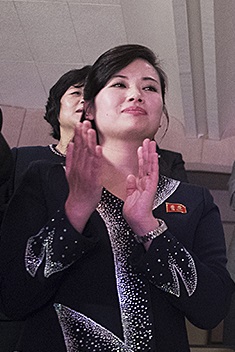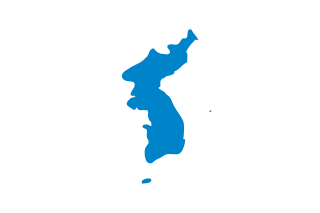| |||||
| Centuries: | |||||
|---|---|---|---|---|---|
| Decades: | |||||
| See also: | Other events of 2020 Years in North Korea Timeline of Korean history 2020 in South Korea | ||||
Events of 2020 in North Korea.
| |||||
| Centuries: | |||||
|---|---|---|---|---|---|
| Decades: | |||||
| See also: | Other events of 2020 Years in North Korea Timeline of Korean history 2020 in South Korea | ||||
Events of 2020 in North Korea.
On October 10, North Korea unveiled the missile Hwasong-16. [8]

The Korean conflict is an ongoing conflict based on the division of Korea between North Korea and South Korea, both of which claim to be the sole legitimate government of all of Korea. During the Cold War, North Korea was backed by the Soviet Union, China, and other allies, while South Korea was backed by the United States, United Kingdom, and other Western allies.
The Sunshine Policy is one of the approaches for South Korea's foreign policy towards North Korea. Its official title is The Reconciliation and Cooperation Policy Towards the North, and it is also known as The Operational Policy Towards the North and The Embracing Policy.

The Kaesŏng Industrial Region (KIR) or Kaesŏng Industrial Zone (KIZ) is a special administrative industrial region of North Korea (DPRK). It was formed in 2002 from part of the Kaesŏng Directly-Governed City. On 10 February 2016, it was temporarily closed by the South Korean government and all staff recalled by the Park Geun-hye administration, although the former President of South Korea, Moon Jae-in, signalled his desire to "reopen and expand" the region in 2017.

Formerly a single nation that was annexed by Japan in 1910, the Korean Peninsula has been divided into North Korea and South Korea since the end of World War II on 2 September 1945. The two governments were founded in the two regions in 1948, leading to the consolidation of division. The two countries engaged in the Korean War from 1950 to 1953 which ended in an armistice agreement but without a peace treaty. North Korea is a one-party totalitarian state run by the Kim family. South Korea was formerly governed by a succession of military dictatorships, save for a brief one-year democratic period from 1960 to 1961, until thorough democratization in 1987, after which direct elections were held. Both nations claim the entire Korean Peninsula and outlying islands. Both nations joined the United Nations in 1991 and are recognized by most member states. Since the 1970s, both nations have held informal diplomatic dialogues in order to ease military tensions.

Kim Jong Un is a North Korean politician who has been supreme leader of North Korea since 2011 and the leader of the Workers' Party of Korea (WPK) since 2012. He is the third son of Kim Jong Il, who was North Korea's second supreme leader from 1994 until his death in 2011, and Ko Yong Hui. He is a grandson of Kim Il Sung, who was the founder and first supreme leader of North Korea from its establishment in 1948 until his death in 1994.

Daily NK is an online newspaper based in Seoul, South Korea, where it reports on various aspects of North Korean society from information obtained from inside and outside of North Korea via a network of informants. North Korea is ranked last out of 180 in the 2023 World Press Freedom Index, which is compiled by Reporters Without Borders.

The death of Kim Jong Il was reported by North Korean state television news on 19 December 2011. The presenter Ri Chun-hee announced that he had died on 17 December at 8:30 am of a massive heart attack while travelling by train to an area outside Pyongyang. Reportedly, he had received medical treatment for cardiac and cerebrovascular diseases, and during the trip, Kim was said to have had an "advanced acute myocardial infarction, complicated with a serious heart shock". However, it was reported in December 2012 by South Korean media that the heart attack had instead occurred in a fit of rage over construction faults in a crucial power plant project at Huichon in Chagang Province.

Choe Ryong-hae is a North Korean politician and military officer who currently serves as Chairman of the Standing Committee of the Supreme People's Assembly and First Vice President of the State Affairs Commission, holding both positions since April 2019. Due to holding the first office, he was considered the head of state of North Korea before the country's constitution was amended to transfer this position to the President of the State Affairs Commission, Kim Jong Un. He is also a member of the Presidium of the Politburo and Vice Chairman of the Workers' Party of Korea (WPK). He also served as Supreme Leader Kim Jong Un's military second-in-command, currently being third top-ranking official in North Korea after Kim Jong Un and premier Kim Tok-hun.

Hyon Song-wol is a North Korean singer, band leader, and politician. She is the leader of the Moranbong Band and of the Samjiyon Orchestra. She was formerly a featured vocalist for the Pochonbo Electronic Ensemble in the early 2000s, a pop group which found fame in North Korea in the late 1980s and 1990s. She has been a member in the Central Committee of the Workers' Party of Korea since 2017.

Kim Yo Jong is a North Korean politician and diplomat. She is the Deputy Department Director of the Publicity and Information Department of the Workers' Party of Korea (WPK). Since September 2021, she has been a member of State Affairs Commission of North Korea, the only woman on the panel.
The following lists events that happened in 2013 in the Democratic People's Republic of Korea. In 2013, tensions between North Korea and South Korea, the United States, and Japan escalated because of United Nations Security Council Resolution 2087, which condemned North Korea for the launch of Kwangmyŏngsŏng-3 Unit 2. The crisis was marked by increased rhetoric by the new North Korean administration under Kim Jong-un and actions suggesting imminent nuclear attacks against South Korea, Japan, and the United States.
In the year 2016, North Korea conducted two nuclear tests: one in January and the other in September. Additionally, the country conducted several missile tests. As consequence, the United Nations Security Council adopted three resolutions against North Korea.
The September 2018 inter-Korean summit was the third and final inter-Korean summit in the 2018-19 Korean peace process.

The Inter-Korean Liaison Office (Korean: 남북공동연락사무소) was a joint liaison office of North Korea and South Korea located in North Korea's Kaesong Industrial Region.
The 2018−19 Korean peace process was initiated to resolve the long-running Korean conflict and denuclearize Korea. International concerns about North Korea's nuclear weapons came to a head in 2017, when they posed a direct threat to the United States. At the same time, Moon Jae-in was elected president of South Korea with the promise of returning to the Sunshine Policy, favoring good relations with North Korea. A series of summits were held between North Korea's Kim Jong Un, South Korea's Moon, and Donald Trump of the United States. Trump became the first sitting US President to meet a North Korean leader and to enter North Korean territory. Kim became the first North Korean leader to enter South Korean territory. Moon became the first South Korean President to give a speech in North Korea. In parallel to this, a number of cultural exchanges began. Tensions were lowered on both sides of the DMZ.
Choe Hwi is a North Korean politician. He is a Vice Chairman of the Workers' Party of Korea (WPK) and the chairman of the State Physical Culture and Sports Guidance Commission. Choe's portfolio as the Vice Chairman of the party covers workers' and social organizations affairs. Choe is also an alternate member of the Politburo of the WPK, member of the Central Committee of the WPK, and a deputy to the Supreme People's Assembly.

The COVID-19 pandemic in North Korea was part of an ongoing global pandemic of coronavirus disease 2019 (COVID-19), a novel infectious disease caused by severe acute respiratory syndrome coronavirus 2 (SARS-CoV-2). North Korea confirmed its first case on 8 May 2022.
The Pyongyang General Hospital is a hospital under construction in Pyongyang, North Korea. The hospital is located in front of Monument to Party Founding. Its groundbreaking took place on 19 March 2020, during the COVID-19 pandemic, and its construction proceeded on the basis of a "speed campaign" with an expected completion date of October 2020, before the 75th anniversary celebrations of the Workers' Party of Korea.

The 8th Congress of the Workers' Party of Korea was held at the April 25 House of Culture in Pyongyang from 5 to 12 January 2021. A total of 7,000 people participated in the congress including 5,000 delegates. The Party Congress took place in the midst of the COVID-19 pandemic where no cases were reported.
Events in the year 2021 in North Korea.